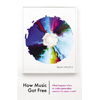This article is more than 1 year old
How Music Got Free and Creatocracy
What happens when an entire generation commits the same crime?
Whistle for it
Witt thinks the music industry was clobbered, while the movie industry fared better, because it had refused to play nicely with politicians. While the MPAA had knuckled down to self-censorship, the music industry hadn’t.
“Morris had personally championed the First Amendment rights of his artists with enthusiasm, sometimes at great personal costs”. So it had few friends in DC when it came calling asking for stronger enforcement. Perhaps politicians cynically calculated as one of Witt’s witnesses suggests, that there were more voters stealing music than working in record shops. Snubbed, it did largely did the enforcement it itself.
For a while back at the turn of the century, we all wondered if piracy actually helped music sales? It may have done for a year or two, until the mass market MP3 player came along, and liberated the vast collections that Witt and others had amassed from Napster and Limewire.
Then you could play your stash on the bus, in the car and while jogging. In 1999 and 2000, the music industry was fighting two lawsuits at once, against Diamond’s Rio MP3 player and against Napster. It won Rio and lost Napster: it would have been better the other way around.
New to me was the scale and sociology of the unlicensed supply chain: the leakers and the mysterious world of leaking operations like RNS, topside sites and Torrent trackers. Here you will discover who drew the ASCII marijuana leaf in that Torrent’s .NFO file.
The artist didn’t do much else in life. This had got deadly serious once organised uploaders got hold of big hits, leaking them weeks before their release date. Pirates released the entire fourth series of the Wire before a single episode had been transmitted.
Perhaps because he co-operated with the author, Universal’s Morris comes over as sympathetic. Not for a moment did Morris presume to be a visionary or tastemaker. His insight came from watching the sales returns closely, looking for small spikes. If a song was widely popular locally, with the necessary promotion, it could be a smash hit nationally.
This is why Hootie and the Blowfish sold almost 20m copies of Cracked Rear View Mirror. It’s all his fault.
After being retired at UMG, Morris is offered a job by Steve Jobs to start an Apple record label. Morris doesn’t think Job’s no-advance model will work.
OiNK founder Alan Ellis is also treated sympathetically, naively clinging to the belief that providing links isn’t infringement. (He was lucky) Even though Witt was a file-sharer himself, he has no time for the blowhard, “self-congratulatory” rhetoric that file sharers use.
It’s a dustjacket cliché to say something is compulsively readable but this really is. Witt's storytelling is so good and tight, you will find it very hard to put down. Before I started it, I didn’t think you could get a decent history from looking at from just two isolated stories, no matter how interesting they are.
If Fraunhofer’s encoder hadn’t become the standard, surely another would have? The demand for free music was unquenchable, and they weren’t the only game in town. Similarly it seems a stretch to attribute the collapse to a leaky supply chain and groups like RNS. There were others. But you’ll be so engrossed, you won’t notice.
 Author Stephen Witt
Author Stephen Witt
Title How Music Got Free: What happens when an entire generation commits the same crime?
Publisher Bodley Head
Price £20 (Hardback), £9.98 (eBook)
More info Publication web site
